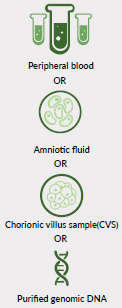
Cardiac Channelopathy genetic testing helped identify the exact mutations which dictated a 19-year-old girl’s treatment modality, with a history of seizures at the neurological department at Amrita Hospital, Kochi.
This patient had a history of seizures, where during each episode she was reported to become unresponsive with seizure-like activity while falling asleep. These episodes were short lived; during her first attack, she was only unresponsive for a brief period, and did not receive any medical attention. However, during her subsequent episodes, she had up-rolling of eyeballs along with unresponsiveness and was brought to the hospital. Brain CT was normal, and she was diagnosed with epilepsy. Since she also complained of a vague chest pain, she was referred to the cardiology department for a consultation & underwent an ECG, which showed a prolonged QT interval of 506 milliseconds (QTc), which is markedly above-normal. The working diagnosis was that of ‘long QT syndrome’.
‘For accurate treatment modality, we recommended our patient to undergo molecular testing,’ said Dr. Hisham Ahamed, Associate Professor in Cardiology, Amrita Institute of Medical Sciences and Research, Kochi. Her family agreed, and her blood sample was sent to MedGenome Labs, Bengaluru, for a cardiac channelopathy panel. This panel can identify mutations in cardiac ion channels that may result in any abnormal variation in QT interval. The genetic panel results showed that the patient had a mutation in KCNH2 and was therefore diagnosed as having type 2 long QT syndrome. Symptoms include transient loss of consciousness, seizures and irregular beating of the heart. After diagnosis, the patient was started on beta-blockers and is planned for an AICD implantation.
Summary
- In most of the cases, Long QT syndrome is an inherited autosomal dominant syndrome.
- About 75% of the inherited long QT syndrome is caused due to mutations in 3 ion channel proteins that can result in one of three types of long QT syndrome — type 1, 2 or 3.
- Type 1 (LQ1) is caused due to a disruption of the potassium ion channel activity and the consequent disruption of the heart’s electrical activity.
- Type 2 (LQ2) is caused due to insufficient potassium ion activity in the heart and can be triggered due to emotional stress and loud noises.
- Type 3 (LQ3) is due to mutations in sodium ion channels and occurs due to low levels of sodium flow in the heart, leading to arrhythmia.
About MedGenome
MedGenome is the leading solution provider of clinical genomics for Physicians and Healthcare providers across India and offers unmatched expertise in clinical diagnosis, carrier testing, genetic counseling and validation of inheritance pattern. Our research solutions apply cutting-edge genomics technologies, bioinformatics, computing, and big data analytics to understand the genetic basis of various disorders.
| Medgenome offers | Test Sample requirements | Required forms | TAT |
| Cardiac channelopathy |  | Test requisition from along with relevant clinical information including pedigree, consanguinity, age of onset, clinical presentation and symptoms | Regular 21 days Expedited 15 days Extended 28 days |

 Enquire
Now
Enquire
Now